(完整版)高三英语过去完成时、将来完成时、现在完成进行时、将来进行时
- 格式:doc
- 大小:124.53 KB
- 文档页数:18
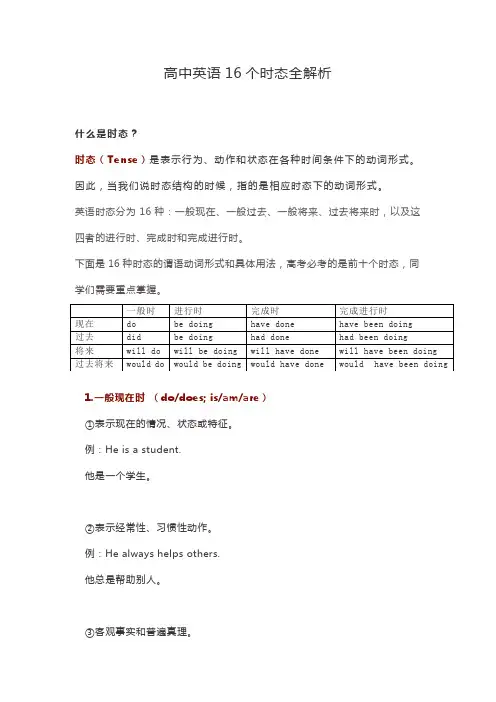
1.一般现在时(do/does; is/am/are)①表示现在的情况、状态或特征。
例:He is a student.他是一个学生。
②表示经常性、习惯性动作。
例:He always helps others.他总是帮助别人。
③客观事实和普遍真理。
例:The earth moves the sun.地球绕着太阳转。
④表示一个按规定、计划或安排要发生的动作。
仅限于某些表示“来、去、动、停、开始、结束、继续”等的动词,可以与表示未来时间的状语搭配使用。
常见的用法是:飞机、火车、轮船、汽车等定期定点运行的交通方式。
例:The next train leaves at 3 o'clock this afternoon.下一趟火车今天下午3点开车。
⑤在时间、条件和让步状语从句中经常用一般现在(有时也用现在完成时)表示将的来事情。
(即:主将从现原则)例:I will call you as soon as I arrive at the airport.我一到机场就会给你打电话。
When you have finished the report, I will have waited for about 3 hours.等你完成这份报告的时候,我就已经等了将近3个小时了。
2. 现在进行时(am/is/are doing)①表示此时此刻正在发生的事情。
例:He is listning to the music now.他现在正在听音乐。
②表示目前一段时间内一直在做的事情,但不一定此时此刻正在做。
例:I am studying computer this term.这个学期我一直在学习计算机。
③现在进行时可以表示将来的含义。
瞬时动词的进行一定表将来。
例: I am leaving.我要离开了。
持续动词的进行只有有将来的时间状语或有将来语境中才表将来。
例: I am travelling next month.下个月我要去旅行。
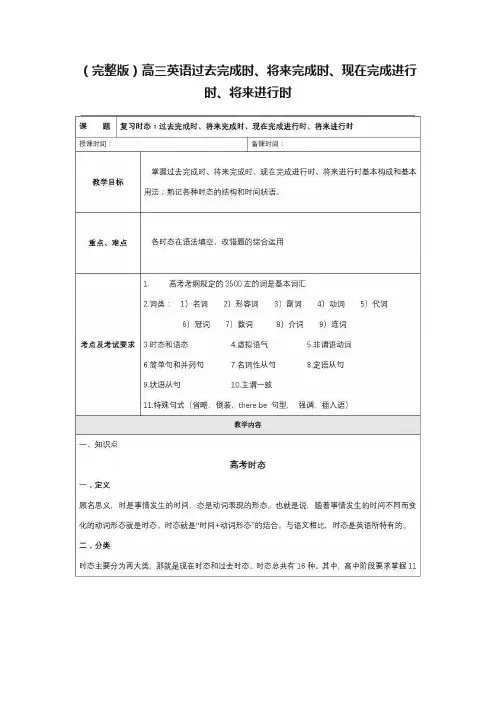
(完整版)高三英语过去完成时、将来完成时、现在完成进行时、将来进行时课后作业一、真题演练:单句语法1.When I die,I____________(give)everything to you.2.That was definitely not an attractive idea,so I politely declined her invitation,.____________(close)m y book and walked away.3.His fear of failure__________(keep)him from classroom games that other students played with joyo usabandon.4._______________(speak)out your inner feeling won’t make you feel ashamed,on the contrary,5._____________(complete)the project as planned,we’ll have to work two more hours a day.6.It was raining lightly when I___61___(arrive)in Yangshuo just before dawn.7. This cycle 48 (go) day after day:The walls warm up during the day and cool off during the night and are thus always a timely offset(抵消) for the outside temperatures.8. In 1969,the pollution was terrible along the Cuyahoga River near Cleveland,Ohio.It 61 (be) unimaginable that it could ever be cleaned up.9. Be patient!T ai C hi 66 (call) “shadow boxing” in English.It asks you to act like water:10.Unless some extra money (find),the theatre will close11.When a new day breaks,the walls have given up their heat and are now cold enough 46 (cool) the house during the hot day;at the same time,they warm up again for the night.12. In addition to their simple beauty,what makes the adobe dwellings admirable is their ability to “air condition” a house without 44 (use) electric equipment.13. The adobe dwellings(土坯房) 41 (build) by the Pueblo Indians of the American Southwest are admired by even the most modern of architects and engineers.二、单选题1. When I was young, I ________ with my grandma in the countryside, which is unforgettable.A. livedB. have livedC. was livedD. had lived2. –Excuse me, is the book Gone with the Wind by Margaret Mitchell available now?-Sorry, but it _________ so well that we don’t have any in store.A. sellsB. is soldC. has soldD. has been sold3. The tourism of Linyi _________ rapid growth over the last decade. Now it’s the second most visited city in Shandong Province.A. sawB. had seenC. is seeingD. has seen4. Great changes _____place in my hometown during the past three decades.A. tookB. have takenC. were takenD. have been taken5.Leave me alone. I ________ an article all the afternoon and haven’t finished yet.A. writeB. have been writingC. have writtenD. wrote6. When the power of love _______ the love of power, the world will likely be in peace.A. overcomesB. will overcomeC. is overcomingD. overcame7. Mr. Black ________ Shanghai in a few days. Shall we have a party?A. leavesB. is leavingC. leftD. has left8. –Look, it _________ again.–Yeah. This is the third snow we __________ this spring.A. will snow, are havingB. has snowed, had hadC. is snowing, have hadD. snows, have had9. Mr. White ____ in our school for nearly forty years before he retired last month.A. workedB. has workedC. had workedD. would work10. The project ________ to developing the economy and reducing poverty when it is completed.A. has contributedB. had been contributedC. will contributeD. is contributed11. Nelson Mandela __________ peacefully at his Johannesburg home on Thursday, President Jacob Zuma said.A. diesB. diedC. has diedD. was died12. –I thought you _____________ for vacation tomorrow.-I had planned, but I have a very important meeting to attend tomorrow.A. will leaveB. are leavingC. have leftD. were leaving13. Our manager ________for Shanghai in a few days and he has asked me to find out when the earliest plane ________ next Wednesday.A. is leaving, takes offB. will leave, is taking offC. leaves, will take offD. is to leave, is going to take off14. I’m calling about the apartment you ______the other day .Could you tell me more about it?A .advertised B. had advertised C. were advertising D. will advertise15. Whenever you______a present, you should think about it from the receiver’s point of view.A. boughtB. have boughtC. will buyD. buy16. I walked slowly through the market, where people ______ all kinds of fruits and vegetables. I studied the prices carefully and bought what I needed.A. sellB. were sellingC. had soldD. have sold17. The twins, who _______ their homework, were allowed to play badminton on the playground.A. will finishB. finishC. have finishedD. had finished18. The journey was tiring! All the seats in the train _______. I had to stand all the way.A. were occupiedB. would be occupiedC. would occupyD. had occupied19. Yesterday afternoon, I ______my homework when Mary called.A. had doneB. was doingC. would doD. am doing20. Close the door of fear behind you, and you ______ thedoor of faith open before you.A. sawB. have seenC. will seeD. are seeing21. Tommy is planning to buy a car. By next month ,he____ enough for a used one.A. saves B .saved C. will save D. will have saved22. She was surprised to find the fridge empty; the child _____ everything!A. had been eatingB. had eatenC. have eatenD. have been eating23. Despite the previous rounds of talks, no agreement______ so far by the two sides.A. has been reachedB. was reachedC. will reachD. will have reached24. More expressways _______in Sichuan soon to promote the local economy.A. are being builtB. will be builtC. have been builtD. had been built25 After school we went to the reading-room to do some reading, only to be told that it _____.A. was decoratedB. had decoratedC. had been decoratingD. was being decorated三、语法填空(共10小题;每小题1.5分,满分15分)阅读下面短文,在空白处填入1个适当的单词或括号内单词的正确形式。
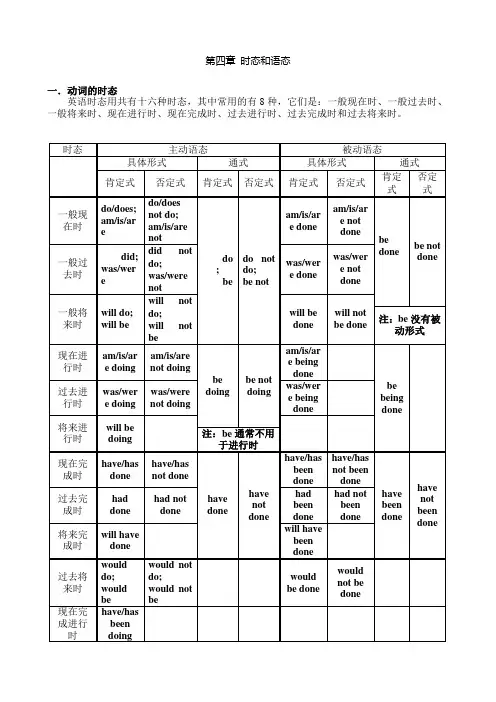
第四章时态和语态一.动词的时态英语时态用共有十六种时态,其中常用的有8种,它们是:一般现在时、一般过去时、一般将来时、现在进行时、现在完成时、过去进行时、过去完成时和过去将来时。
一. 一般现在时.1.构成. be动词:am is are ; 其他动词用动词原形,当主语是第三人称单数时要在谓语动词后加“s”,其变化规则与名词变复数一致。
2.用法. 1). 经常性或习惯性的动作,常与表示频度的时间状语连用。
如usually, always, often, seldom, never, every...,eg. I leave home for school at 7 every morning.I don’t leave home for school at 7 every morning.Do I leave home for school at 7 every morning?He usually gets up early.He doesn’t usually get up early.Does he usually get up early?2) 客观真理,客观存在,科学事实。
eg. The earth moves around the sun.The earth doesn’t move around the sun 否定句Does the earth move around the sun? 疑问句Shanghai lies in the east of China.Shanghai doesn’t lie in the east of China 否定句Does Shanghai lie in the east of China? 疑问句Water boils at 100 centigrade degrees.3) 表示格言或警句中eg. Pride goes before a fall.注意. 此用法如果出现在宾语从句中,即使主句是过去时,从句谓语也要用一般现在时。

一般时态:一般过去时●一般现在时●一般将来时●进行时态:过去进行时●现在进行时●将来进行时●完成时态:过去完成时●现在完成时●将来完成时▲完成进行时:过去完成进行时▲现在完成进行时将来完成进行时▲willwouldwould do将来进去将来进行时should be doing , would be doing▲should have done , would have done▲过去将来完成进行时should have been doing,would have been doing▲一般时态:一般过去时一般现在时一般将来时Did do/does willdo进行时态:过去进行时现在进行时将来进行时was/were doing am/is/are doing will be doing完成时态:过去完成时现在完成时将来完成时had done have/has done will have done完成进行时:过去完成进行时现在完成进行时将来完成进行时Had been doing have/has been doing will have beendoing暗示举措或状态发生时间和方式的动词形式.间段)间点). . . . . . . . . .. . ..完成时态:截止到某一个时间点,某个举措已经完成(时间点)间点)一般过去时She got up early, fetched water, cleaned the room and then went out for a walk陈说已做的事情一般现在时The next train leaves at 3 o'clock this afternoon 陈说火车下午三点发车这件事儿一般将来时He will come back soon.叙述将要发生的事情现在完成时John has broken his left leg强调已发生过去完成时By the time my parents reached home yesterday, I had cooked the dinner already直至到昨天父母回来的那一刻,我已经把晚餐准备好了将来完成时现在完成进行时We have been working on this project for over a month now 到现在时间点已完成一部份,另外的在今后在完成将来完成进行时By the end of next month, the project will have been being worked for 3 years.到下个月的一个时间点已完成部份,并在将来的一段时间内继续过去完成进行时:I had been looking for it for days before I found it. 这工具我找了好多天才找着的1.I can guess you were in a hurry.You____your sweater inside out.A.had wornB.woreC.were wearingD.are wearing2.—— We _____ that you would fix the TV set this week.—— I’m sorry.I _____ to fix it this week, but I’ve been too busy.A.had expected;had intendedB.are expecting;had intendedC.expect; intendD.expected; intend3.He will stop showing off, if no notice _____ of him.A.is takenB.will be takenC.takesD.has taken4.——It is said that another new car factory_____now.—— Yeah.It _____one and a half years.A.is building; takesB.is being built; will takeC.is built; will takeD.is being built; takes5.——I’m sorry, but I shouldn’t have been so rude to you.—— You _____ your temper but that’s OK.A.have lostB.had lostC.did loseD.were losing6.—— Why? Tom, your shirt is so dirty!—— Mum, I _____ my storeroom downstairs.A.cleanedB.have workedC.was cleaningD.have been cleaning’ve won a holiday for two to Florida.I _____ my mum.A.takeB.am takingC.have takenD.will have taken10.The traffic in our city is already good and it ___even better.A.getsB.gotC.has gotD.is getting11.—— Has Jack finished his homework yet?—— I have no idea; he ___it this morning.A.was doingB.had been doing12.——I will come to attend your lecture at 10:00 tomorrow.—— I’m sorry, by then my lecture will have ended and I ___my guests in my office.A.is being metB.will meetC.will be meetingD.will have met13.—— Alice came back home the day before yesterday.—— Really ? Where _____ ?A.has she beenB.had she beenC.has she goneD.had she gone14.John and I___friends for eight years.We first got to know each other at a Christmas party.But we_____each other a couple of times before that.A.had been; have metB.have been; have metC.had been; had metD.have been; had met15.I ____ ping-pong quite well, but I haven’t had time to play since the new year.1.D.can guess 这一现在猜想是建立在眼前所见情景的基础上的,故用现在进行时.2.A.expect, intend, want, wish, hope, plan 等动词的过去完成式可暗示过去未曾实现的想法、愿望、筹算等.3.A.如主句用将来时,在时间、条件和让步状语从句中要用一般现在时暗示将来.又因if 从句是take notice of...的主动语态结构,故选A.4.B.根据主语与build之间的主动关系和now, 可知要选现在进行时的主动语态;因工厂正在修建,花费一年半应指将来.5.C.shouldn’ t have done 暗示“过去本不应……”.You did lose your temper 是You lost your temper 的强调形式.6.D.现在完成进行时暗示从过去某时到现在一直在进行的举措.7.B.句意为:他们(现在)不愿买新衣服,因为他们在攒钱买电视.由此可见,攒钱是现阶段正在进行的举措.8.C.担忧是从过去某时到说话时为止一直在进行的举措,用现在完成时;expect 是在过去某一段时间里(整个晚上)正在进行的举措,故用过去进行时.9.B.论文已完成,花费一个月时间应指过去;某事花费某人几多时间用sth.takes sb.some time 结构.10.D.交通现在已经好了,在此基础上正在变得更好.11.A.题干没有构成“过去的过去”,不成选 B.如选C、D则暗示举措已完成,与have no idea相矛盾.过去进行时暗示过去某段时间或某一时刻正在进行的举措,不涉及结果,正好附合题干语境. 12.C.by then 是指将来的时间状语,排除 A.再由句意可知,meet 指的是到了十点钟时将正在进行的举措.13.B.问句问的是前天回来之前去了哪儿,故用过去完成时.注意had gone暗示人未回来,与第一句相矛盾.14.D.for+时间段暗示从过去某时延续至今的举措或状态,用现在完成时;meet发生在got to know 这一过去举措之前,用过去完成时.15.D.用一般现在时暗示现在的特征或状态.e, go, leave, arrive, take 等动词经常使用进行时表砂将来.17.D.暗示过去没有做某事应用去时.又因句子没有"过去正在进行"之意,帮排除A.18.B.问对方"去了哪里",指的是从过去某时到现在为止的举措,用现在完成时;第二个空格是与过去事实相反的虚拟语气和主句,条件状语从句If I hadn’ t got stuck in the heavy traffic 被省略.19.C.在一个国际会议上被介绍显然发生在过去.20.B.此句为复杂特殊疑问句结构,即“疑问词+do you think (believe, suppose, expect, imagine, say, consider, guess 等)+其它(陈说语序)?”.。
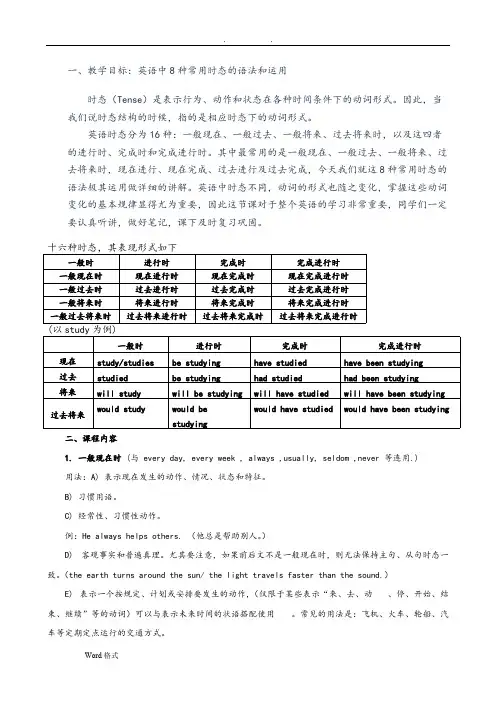
一、教学目标:英语中8种常用时态的语法和运用时态(Tense)是表示行为、动作和状态在各种时间条件下的动词形式。
因此,当我们说时态结构的时候,指的是相应时态下的动词形式。
英语时态分为16种:一般现在、一般过去、一般将来、过去将来时,以及这四者的进行时、完成时和完成进行时。
其中最常用的是一般现在、一般过去、一般将来、过去将来时,现在进行、现在完成、过去进行及过去完成,今天我们就这8种常用时态的语法极其运用做详细的讲解。
英语中时态不同,动词的形式也随之变化,掌握这些动词变化的基本规律显得尤为重要,因此这节课对于整个英语的学习非常重要,同学们一定要认真听讲,做好笔记,课下及时复习巩固。
十六种时态,其表现形式如下一般时进行时完成时完成进行时一般现在时现在进行时现在完成时现在完成进行时一般过去时过去进行时过去完成时过去完成进行时一般将来时将来进行时将来完成时将来完成进行时一般过去将来时过去将来进行时过去将来完成时过去将来完成进行时(以study为例)一般时进行时完成时完成进行时现在study/studies be studying have studied have been studying 过去studied be studying had studied had been studying将来will study will be studying will have studied will have been studying过去将来would study would bestudyingwould have studied would have been studying 二、课程内容 1. 一般现在时 (与 every day, every week , always ,usually, seldom ,never 等连用.)用法:A) 表示现在发生的动作、情况、状态和特征。
B) 习惯用语。
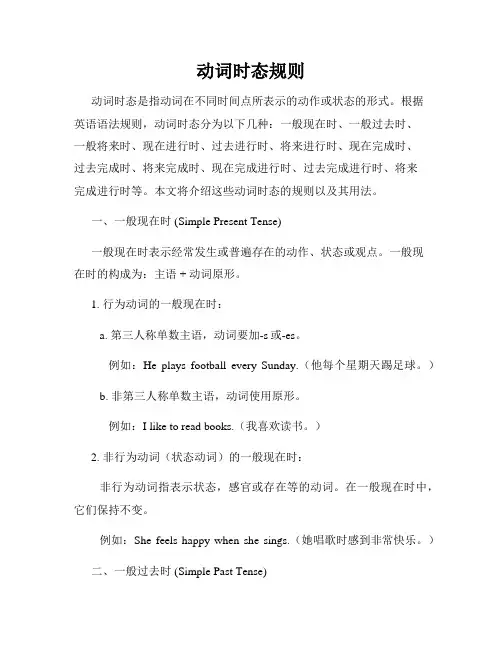
动词时态规则动词时态是指动词在不同时间点所表示的动作或状态的形式。
根据英语语法规则,动词时态分为以下几种:一般现在时、一般过去时、一般将来时、现在进行时、过去进行时、将来进行时、现在完成时、过去完成时、将来完成时、现在完成进行时、过去完成进行时、将来完成进行时等。
本文将介绍这些动词时态的规则以及其用法。
一、一般现在时 (Simple Present Tense)一般现在时表示经常发生或普遍存在的动作、状态或观点。
一般现在时的构成为:主语 + 动词原形。
1. 行为动词的一般现在时:a. 第三人称单数主语,动词要加-s或-es。
例如:He plays football every Sunday.(他每个星期天踢足球。
)b. 非第三人称单数主语,动词使用原形。
例如:I like to read books.(我喜欢读书。
)2. 非行为动词(状态动词)的一般现在时:非行为动词指表示状态,感官或存在等的动词。
在一般现在时中,它们保持不变。
例如:She feels happy when she sings.(她唱歌时感到非常快乐。
)二、一般过去时 (Simple Past Tense)一般过去时表示过去发生的具体动作、状态或习惯动作。
一般过去时的构成为:主语 + 动词过去式。
1. 行为动词的一般过去时:a. 所有人称主语,动词使用过去式。
例如:They watched a movie last night.(他们昨晚看了一部电影。
)b. 动词过去式为不规则动词的规则形式。
例如:She went to school yesterday.(她昨天去上学了。
)2. 非行为动词(状态动词)的一般过去时:非行为动词在一般过去时中,仍保持不变。
例如:I knew the answer to the question.(我知道问题的答案。
)三、一般将来时 (Simple Future Tense)一般将来时表示将要发生的动作、事件或存在的状态。
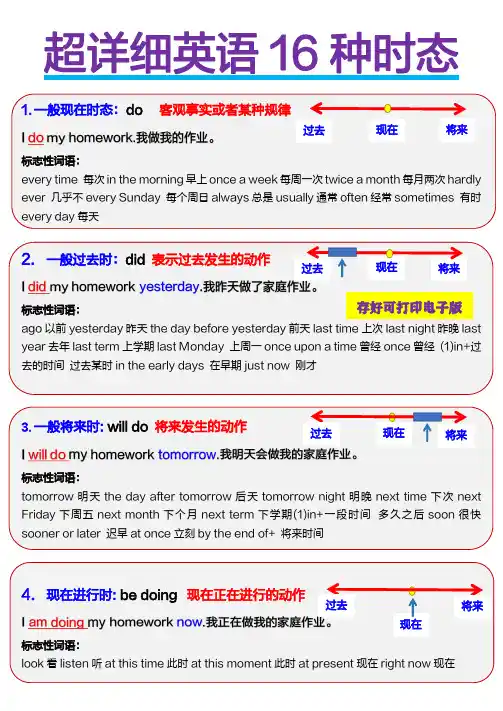
超详细英语16种时态1.一般现在时态:do客观事实或者某种规律标志性词语:every time每次in the morning早上once a week每周一次twice a month每月两次hardly ever几乎不every Sunday每个周日always总是usually通常often经常sometimes有时every day每天2.一般过去时:did表示过去发生的动作标志性词语:ago以前yesterday昨天the day before yesterday前天last time上次last night昨晚last year去年last term上学期last Monday上周一once upon a time曾经once曾经(1)in+过去的时间过去某时in the early days在早期just now刚才3.一般将来时:will do将来发生的动作标志性词语:tomorrow明天the day after tomorrow后天tomorrow night明晚next time下次next Friday下周五next month下个月next term下学期(1)in+一段时间多久之后soon很快sooner or later迟早at once立刻by the end of+将来时间4.现在进行时:be doing现在正在进行的动作标志性词语:look看listen听at this time此时at this moment此时at present现在right now现在过去现在将来过去现在将来过去过去现在现在将来将来存好可打印电子版5.过去进行时:was/were doing表示过去一个具体时间正在发生的动作标志性词语:at that time在那时at that moment在那时6.将来进行时:will be doing在将来正在发生的动作标志性词语:tomorrow,the day after tomorrow;soon;next week/month/year/...; the week/month/year7.现在完成时:have/has done现在已经完成的动作标志性词语:already已经yet还just刚才never从不ever曾经before以前up to now目前为止so far 目前为止for+一段时间since+过去某一时间8.过去完成时:had done过去已经完成的动作标志性词语:(1)by+过去时间点by the time到..时候为止by then到那时候by last time最后一次by the end of last week到了上周末(2)before+过去时间点(3)up until+过去时间点up until then直到那时up until last time直到上次过去过去过去过去现在现在现在现在将来将来将来将来9.将来完成时:will have done将来某一时间以前已经完成标志性词语:the day after tomorrow;soon;next10.现在完成进行时:have/has been doing现在已经完成(一段时间)并还在持续进行的动作11.过去完成进行时:had been doing过去已经完成(一段时间)并还在持续进行的动作12.将来完成进行时:will have been doing在将来某个时间已经完成(一段时间)并且还在持续进行的动作13.过去将来时:would do/was going to从过去某个时间来看将要发生的事标志性词语:the following month下个月the next time下次the next Friday下周五the next term下学期过去过去过去过去过去现在现在现在现在现在将来将来将来将来将来14.过去将来进行时:would be doing在过去的时间说将来某一时间点正在进行的动作15.过去将来完成时:would have done在过去的时间说将来某一时间已经完成的动作16.过去将来完成进行时:would have been doing在过去的时间说将来某一时间已经完成(一段时间)并还在持续进行的动作过去过去过去现在现在现在将来将来将来16大时态考试常考定义一般现在时表示经常性、习惯性的动作一般将来时表示即将发生的动作、计划打算的动作一般过去时表示过去的动作、过去习惯性的动作现在进行时表示此刻正在进行的动作现在完成时表示过去的动作对现在的影响或持续到现在将来进行时表示在将来的某一时刻以前已经完成或一直持续将来完成时表示将来的某一时间以前已经完成或者仍要继续过去进行时表示过去某一个时间点正在进行的动作过去将来时表示从过去的某一时刻看过去的将来发生的动作过去完成时表示过去某一个时间点以前发生的动作(过去的过去)过去完成进行时表示从过去的某个动作前开始,一直延续到另一个时刻过去将来进行时表示对过去的某一个动作而言,将来的动作正在进行过去将来完成时过去将来某一时刻前发生的动作,对过去将来产生影响现在完成进行时表示动作从的某一时刻开始一直持续。
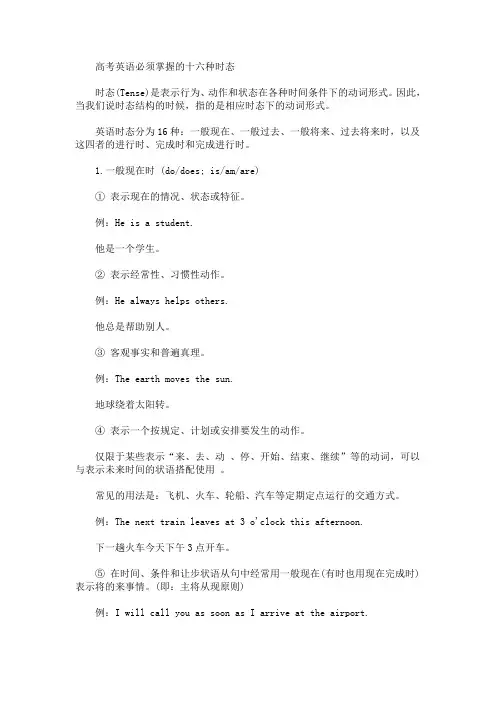
高考英语必须掌握的十六种时态时态(Tense)是表示行为、动作和状态在各种时间条件下的动词形式。
因此,当我们说时态结构的时候,指的是相应时态下的动词形式。
英语时态分为16种:一般现在、一般过去、一般将来、过去将来时,以及这四者的进行时、完成时和完成进行时。
1.一般现在时 (do/does; is/am/are)① 表示现在的情况、状态或特征。
例:He is a student.他是一个学生。
② 表示经常性、习惯性动作。
例:He always helps others.他总是帮助别人。
③ 客观事实和普遍真理。
例:The earth moves the sun.地球绕着太阳转。
④ 表示一个按规定、计划或安排要发生的动作。
仅限于某些表示“来、去、动、停、开始、结束、继续”等的动词,可以与表示未来时间的状语搭配使用。
常见的用法是:飞机、火车、轮船、汽车等定期定点运行的交通方式。
例:The next train leaves at 3 o'clock this afternoon.下一趟火车今天下午3点开车。
⑤ 在时间、条件和让步状语从句中经常用一般现在(有时也用现在完成时)表示将的来事情。
(即:主将从现原则)例:I will call you as soon as I arrive at the airport.我一到机场就会给你打电话。
When you have finished the report, I will have waited for about 3 hours.等你完成这份报告的时候,我就已经等了将近3个小时了。
2. 现在进行时(am/is/are doing)① 表示此时此刻正在发生的事情。
例:He is listning to the music now.他现在正在听音乐。
② 表示目前一段时间内一直在做的事情,但不一定此时此刻正在做。
例:I am studying computer this term.这个学期我一直在学习计算机。
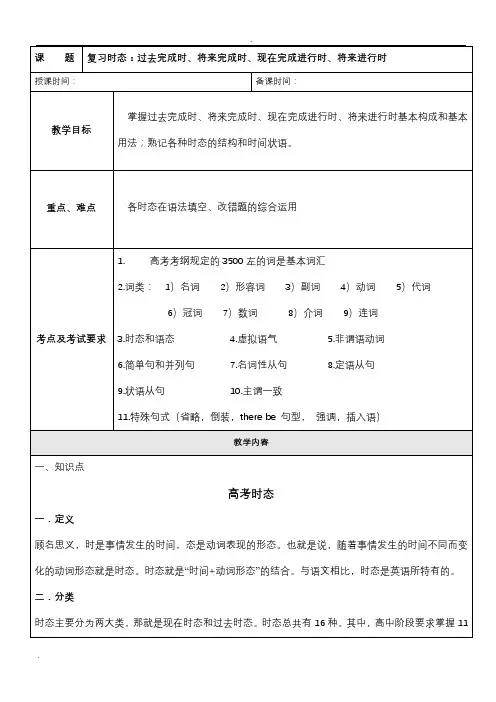
课后作业一、真题演练:单句语法1.When I die,I____________(give)everything to you.2.That was definitely not an attractive idea,so I politely declined her invitation,.____________(close)m y book and walked away.3.His fear of failure__________(keep)him from classroom games that other students played with joyo usabandon.4._______________(speak)out your inner feeling won’t make you feel ashamed,on the contrary,5._____________(complete)the project as planned,we’ll have to work two more hours a day.6.It was raining lightly when I___61___(arrive)in Yangshuo just before dawn.7. This cycle 48 (go) day after day:The walls warm up during the day and cool off during the night and are thus always a timely offset(抵消) for the outside temperatures.8. In 1969,the pollution was terrible along the Cuyahoga River near Cleveland,Ohio.It 61 (be) unimaginable that it could ever be cleaned up.9. Be patient!Tai Chi 66 (call) “shadow boxing” in English.It asks you to act like water:10.Unless some extra money (find),the theatre will close11.When a new day breaks,the walls have given up their heat and are now cold enough 46 (cool) the house during the hot day;at the same time,they warm up again for the night.12. In addition to their simple beauty,what makes the adobe dwellings admirable is their ability to “air condition” a house without 44 (use) electric equipment.13. The adobe dwellings(土坯房) 41 (build) by the Pueblo Indians of the American Southwest are admired by even the most modern of architects and engineers.二、单选题1. When I was young, I ________ with my grandma in the countryside, which is unforgettable.A. livedB. have livedC. was livedD. had lived2. –Excuse me, is the book Gone with the Wind by Margaret Mitchell available now?-Sorry, but it _________ so well that we don’t have any in store.A. sellsB. is soldC. has soldD. has been sold3. The tourism of Linyi _________ rapid growth over the last decade. Now it’s the second most visited city in Shandong Province.A. sawB. had seenC. is seeingD. has seen4. Great changes _____place in my hometown during the past three decades.A. tookB. have takenC. were takenD. have been taken5.Leave me alone. I ________ an article all the afternoon and haven’t finished yet.A. writeB. have been writingC. have writtenD. wrote6. When the power of love _______ the love of power, the world will likely be in peace.A. overcomesB. will overcomeC. is overcomingD. overcame7. Mr. Black ________ Shanghai in a few days. Shall we have a party?A. leavesB. is leavingC. leftD. has left8. –Look, it _________ again.–Yeah. This is the third snow we __________ this spring.A. will snow, are havingB. has snowed, had hadC. is snowing, have hadD. snows, have had9. Mr. White ____ in our school for nearly forty years before he retired last month.A. workedB. has workedC. had workedD. would work10. The project ________ to developing the economy and reducing poverty when it is completed.A. has contributedB. had been contributedC. will contributeD. is contributed11. Nelson Mandela __________ peacefully at his Johannesburg home on Thursday, President Jacob Zuma said.A. diesB. diedC. has diedD. was died12. –I thought you _____________ for vacation tomorrow.-I had planned, but I have a very important meeting to attend tomorrow.A. will leaveB. are leavingC. have leftD. were leaving13. Our manager ________for Shanghai in a few days and he has asked me to find out when the earliest plane ________ next Wednesday.A. is leaving, takes offB. will leave, is taking offC. leaves, will take offD. is to leave, is going to take off14. I’m calling about the apartment you ______the other day .Could you tell me more about it?A .advertised B. had advertised C. were advertising D. will advertise15. Whenever you______a present, you should think about it from the receiver’s point of view.A. boughtB. have boughtC. will buyD. buy16. I walked slowly through the market, where people ______ all kinds of fruits and vegetables. I studied the prices carefully and bought what I needed.A. sellB. were sellingC. had soldD. have sold17. The twins, who _______ their homework, were allowed to play badminton on the playground.A. will finishB. finishC. have finishedD. had finished18. The journey was tiring! All the seats in the train _______. I had to stand all the way.A. were occupiedB. would be occupiedC. would occupyD. had occupied19. Yesterday afternoon, I ______my homework when Mary called.A. had doneB. was doingC. would doD. am doing20. Close the door of fear behind you, and you ______ the door of faith open before you.A. sawB. have seenC. will seeD. are seeing21. Tommy is planning to buy a car. By next month ,he____ enough for a used one.A. saves B .saved C. will save D. will have saved22. She was surprised to find the fridge empty; the child _____ everything!A. had been eatingB. had eatenC. have eatenD. have been eating23. Despite the previous rounds of talks, no agreement______ so far by the two sides.A. has been reachedB. was reachedC. will reachD. will have reached24. More expressways _______in Sichuan soon to promote the local economy.A. are being builtB. will be builtC. have been builtD. had been built25 After school we went to the reading-room to do some reading, only to be told that it _____.A. was decoratedB. had decoratedC. had been decoratingD. was being decorated三、语法填空(共10小题;每小题1.5分,满分15分)阅读下面短文,在空白处填入1个适当的单词或括号内单词的正确形式。
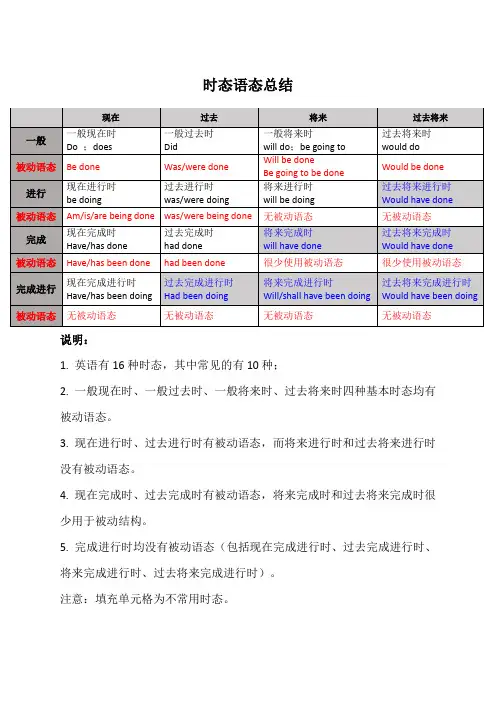
时态语态总结说明:1. 英语有16种时态,其中常见的有10种;2. 一般现在时、一般过去时、一般将来时、过去将来时四种基本时态均有被动语态。
3. 现在进行时、过去进行时有被动语态,而将来进行时和过去将来进行时没有被动语态。
4. 现在完成时、过去完成时有被动语态,将来完成时和过去将来完成时很少用于被动结构。
5. 完成进行时均没有被动语态(包括现在完成进行时、过去完成进行时、将来完成进行时、过去将来完成进行时)。
注意:填充单元格为不常用时态。
▲用法及举例:1. 一般时态的被动语态一般时态的被动形式都由“助动词be+过去分词”构成(动作发生时间由be表现出来) (1) 一般现在时的被动语态In China, the railways are owned by the state. 在中国,铁路是国有的。
They are asked to shoulder the costs of the repair. 要求他们承担这笔修理费。
The new drug began to operate not long after it is taken. 这种新药服用后不久就会开始见效。
(2) 一般过去时的被动语态:Each couple was asked to complete a form. 要求每对夫妇填一张表。
The thief was handed over to the police. 这个小偷已经送交派出所了。
He was admitted into the club as a member. 他被接纳为俱乐部的会员。
(3) 一般将来时的被动语态:The hotel will be closed during repairs. 那家饭店在整修期间将停业。
Light refreshments will be served after the meeting. 会议之后有简单茶点招待。
If you don’t give care to your work, you will be fired. 如果你不细心工作,你会被解聘的。
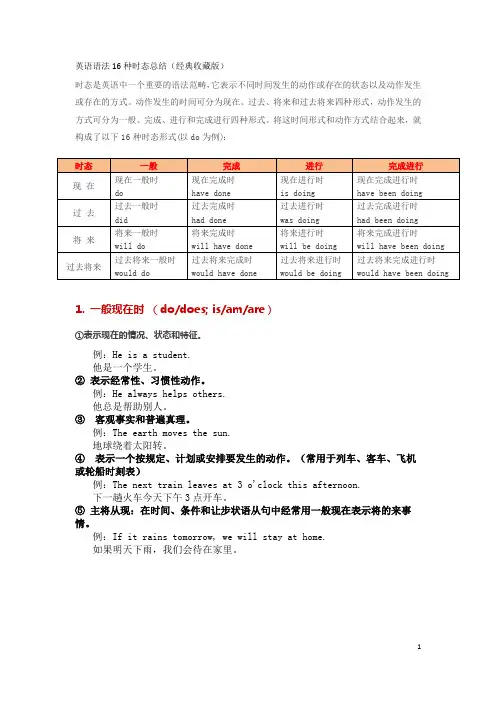
英语语法16种时态总结(经典收藏版)时态是英语中一个重要的语法范畴,它表示不同时间发生的动作或存在的状态以及动作发生或存在的方式。
动作发生的时间可分为现在、过去、将来和过去将来四种形式,动作发生的方式可分为一般、完成、进行和完成进行四种形式。
将这时间形式和动作方式结合起来,就1. 一般现在时(do/does; is/am/are)①表示现在的情况、状态和特征。
例:He is a student.他是一个学生。
② 表示经常性、习惯性动作。
例:He always helps others.他总是帮助别人。
③客观事实和普遍真理。
例:The earth moves the sun.地球绕着太阳转。
④表示一个按规定、计划或安排要发生的动作。
(常用于列车、客车、飞机或轮船时刻表)例:The next train leaves at 3 o'clock this afternoon.下一趟火车今天下午3点开车。
⑤ 主将从现:在时间、条件和让步状语从句中经常用一般现在表示将的来事情。
例:If it rains tomorrow, we will stay at home.如果明天下雨,我们会待在家里。
④现在进行时与频度副词连用,表示说话者或褒义或贬义的感情色彩。
例: He is always helping others.他总是帮助别人。
(褒义)④过去进行时和频度副词连用可以表示说话者或褒义或贬义的感情色彩。
例:When he lived in country,he was always helping the poor.住在乡下时,他总是帮助穷人。
4. 一般将来时①基本结构是will do。
例:We will send her a glass hand-made craft as her birthday gift.我们将送给她一个玻璃的手工制品,作为给她的生日礼物。
②表示“打算…,要…”时,可用 am/is/are going to do。
一、英语时态总结(一)现在时态(Tense)是表示行为、动作和状态在各种时间条件下的动词形式。
因此,当我们说时态结构的时候,指的是相应时态下的动词形式。
英语时态分为16种:一般现在、一般过去、一般将来、过去将来时,以及这四者的进行时、完成时和完成进行时。
在这里,我们重点讲解一下最常见的11种时态的用法和注意事项。
1. 一般现在时:A) 表示现在发生的动作、情况、状态和特征。
eg: It is a nice day.今天天气很好(表现在存在的状态)B) 习惯用语:这个要在平时自己积累,因为习语太多,不做过多解释。
eg: Believe it or not, we won the game.我们赢得了比赛,信不信由你。
口语中常说believe it or not,意思是:“信不信由你”“我说的是真的”。
believe it or not是一个固定说法,相当一个插入语,短语中的believe没有词形变化。
C) 经常性、习惯性动作。
eg: He always helps others. (他总是帮助别人。
)D) 客观事实和普遍真理。
尤其要注意,如果前后文不是一般现在时,则无法保持主句、从句时态一致.eg: He said that the sun rises in the east.他说过太阳从东方升起这个句子要注意,前边虽然said是过去式,但是后边“太阳从东方升起”是个客观真理,故不需同前边一样用过去式,而用一般现在时。
总而言之,记住:客观事实无论谓语的时态是什么都用一般现在时。
E) 表示一个按规定、计划或安排要发生的动作,(仅限于某些表示“来、去、动、停、开始、结束、继续”等的动词)可以与表示未来时间的状语搭配使用。
常见的用法是:飞机、火车、轮船、汽车等定期定点运行的交通方式。
eg: When does the plane leave?飞机什么时候起飞eg: The plane leaves at 3 o’clock this afternoon.飞机将在今下午三点起飞这个句子注意一下,飞机起飞本来是将来时,但为什么不用将来时,因为这里表示一个按规定、计划或安排要发生的动作,飞机起飞时间是规定、计划好了的。
高中英语十大时态一、一般现在时:1.结构:主语 + 动词原形(当主语是第三人称单数时,动词需加“s”或“es”);be 动词根据主语不同用“am/is/are”。
2.用法:●表示现在的情况、状态或特征。
例如:“He is a student.”(他是一个学生。
)●表示经常性、习惯性动作。
例如:“She often goes to school bybike.”(她经常骑自行车上学。
)●表示客观事实和普遍真理。
例如:“The earth moves around thesun.”(地球绕着太阳转。
)●表示按规定、计划或安排要发生的动作,常用于飞机、火车、轮船等定期定点运行的交通方式。
例如:“The next flight takes off at 8 o'clock tomorrow morning.”(下一趟航班明天早上8点起飞。
)二、现在进行时:1.结构:主语 + am/is/are + 动词的现在分词。
2.用法:●表示此时此刻正在发生的事情。
例如:“They are having a meetingnow.”(他们现在正在开会。
)●表示目前一段时间内一直在做的事情,但不一定此时此刻正在做。
例如:“I am learning French this semester.”(这学期我在学法语。
)●现在进行时可以表示将来的含义,通常是一些瞬间动词的进行时表将来,或者持续动词的进行时有将来的时间状语或语境时表将来。
例如:“I am leaving for Beijing tomorrow.”(我明天要去北京。
)三、现在完成时:1.结构:主语 + have/has + 动词的过去分词。
2.用法:●表示动作到现在为止已经完成或刚刚完成,强调对现在产生的影响。
例如:“I have finished my homework, so I can watch TV now.”(我已经完成作业了,所以现在可以看电视了。
教学过程一、课堂导入时态在高考中,单选会考1至2题,完形填空里面对副词的考查也是比较多的,所以也是需要好好掌握的语法点。
二、复习预习复习上一单元的知识点之后,以达到复习的效果。
然后给学生一些相关的单选或其他类型题目,再老师没有讲解的情况下,让学生独立思考,给出答案与解释,促进学生发现问题,同时老师也能发现学生的盲点,并能有针对性地进行后面的讲课。
三、知识讲解知识点1:现在完成时:构成:主语+ have/has + 动词的过去分词用法:1)过去发生的某一动作对现在造成的影响或结果,句中常有already, just, never, ever, lately, recently, , in the past+一段时间,so far等状语2)、从过去开始,持续到现在的动作或状态3)、用在时间、条件从句中,表示从句动作先于主句动作之前完成4)、“最高级+名词”或“It is the + 序数词+ time”后的定语从句中。
5)、应用现在完成时应注意:瞬间动词用于完成时表示一个动作的结束,不能和“for…”或“since…”连用,但它们的否定形式可以连用。
如:We have not heard from him for ten days.我们已经十天没他的消息了。
另外,如果把瞬间动词转变成相应的持续动词,就可和“for…”或“since…”连用。
知识点2:现在完成进行时:构成:主语+ have/has + been +动词的现在分词用法:表示动作从过去一个时间开始,一直延续到现在,强调在此阶段时间里,动作一直在进行。
⑴、过去开始而且现在仍在进行的动作⑵、过去开始,现在刚刚停止的动作⑶、现在看到其直接结果的动作知识点3:过去完成时:构成:主语+ had + 动词的过去分词用法:1)、表示过去某时间或动作之前已发生或完成的动作。
2)、表示从过去某时间开始,持续到过去另一时间的动作或状态,往往和for, since引导的短语或从句连用。
课后作业一、真题演练:单句语法1.When I die,I____________(give)everything to you.2.That was definitely not an attractive idea,so I politely declined her invitation,.____________(close)m y book and walked away.3.His fear of failure__________(keep)him from classroom games that other students played with joyo usabandon.4._______________(speak)out your inner feeling won’t make you feel ashamed,on the contrary,5._____________(complete)the project as planned,we’ll have to work two more hours a day.6.It was raining lightly when I___61___(arrive)in Yangshuo just before dawn.7. This cycle 48 (go) day after day:The walls warm up during the day and cool off during the night and are thus always a timely offset(抵消) for the outside temperatures.8. In 1969,the pollution was terrible along the Cuyahoga River near Cleveland,Ohio.It 61 (be) unimaginable that it could ever be cleaned up.9. Be patient!Tai Chi 66 (call) “shadow boxing” in English.It asks you to act like water:10.Unless some extra money (find),the theatre will close11.When a new day breaks,the walls have given up their heat and are now cold enough 46 (cool) the house during the hot day;at the same time,they warm up again for the night.12. In addition to their simple beauty,what makes the adobe dwellings admirable is their ability to “air condition” a house without 44 (use) electric equipment.13. The adobe dwellings(土坯房) 41 (build) by the Pueblo Indians of the American Southwest are admired by even the most modern of architects and engineers.二、单选题1. When I was young, I ________ with my grandma in the countryside, which is unforgettable.A. livedB. have livedC. was livedD. had lived2. –Excuse me, is the book Gone with the Wind by Margaret Mitchell available now?-Sorry, but it _________ so well that we don’t have any in store.A. sellsB. is soldC. has soldD. has been sold3. The tourism of Linyi _________ rapid growth over the last decade. Now it’s the second most visited city in Shandong Province.A. sawB. had seenC. is seeingD. has seen4. Great changes _____place in my hometown during the past three decades.A. tookB. have takenC. were takenD. have been taken5.Leave me alone. I ________ an article all the afternoon and haven’t finished yet.A. writeB. have been writingC. have writtenD. wrote6. When the power of love _______ the love of power, the world will likely be in peace.A. overcomesB. will overcomeC. is overcomingD. overcame7. Mr. Black ________ Shanghai in a few days. Shall we have a party?A. leavesB. is leavingC. leftD. has left8. –Look, it _________ again.–Yeah. This is the third snow we __________ this spring.A. will snow, are havingB. has snowed, had hadC. is snowing, have hadD. snows, have had9. Mr. White ____ in our school for nearly forty years before he retired last month.A. workedB. has workedC. had workedD. would work10. The project ________ to developing the economy and reducing poverty when it is completed.A. has contributedB. had been contributedC. will contributeD. is contributed11. Nelson Mandela __________ peacefully at his Johannesburg home on Thursday, President Jacob Zuma said.A. diesB. diedC. has diedD. was died12. –I thought you _____________ for vacation tomorrow.-I had planned, but I have a very important meeting to attend tomorrow.A. will leaveB. are leavingC. have leftD. were leaving13. Our manager ________for Shanghai in a few days and he has asked me to find out when the earliest plane ________ next Wednesday.A. is leaving, takes offB. will leave, is taking offC. leaves, will take offD. is to leave, is going to take off14. I’m calling about the apartment you ______the other day .Could you tell me more about it?A .advertised B. had advertised C. were advertising D. will advertise15. Whenever you______a present, you should think about it from the receiver’s point of view.A. boughtB. have boughtC. will buyD. buy16. I walked slowly through the market, where people ______ all kinds of fruits and vegetables. I studied the prices carefully and bought what I needed.A. sellB. were sellingC. had soldD. have sold17. The twins, who _______ their homework, were allowed to play badminton on the playground.A. will finishB. finishC. have finishedD. had finished18. The journey was tiring! All the seats in the train _______. I had to stand all the way.A. were occupiedB. would be occupiedC. would occupyD. had occupied19. Yesterday afternoon, I ______my homework when Mary called.A. had doneB. was doingC. would doD. am doing20. Close the door of fear behind you, and you ______ the door of faith open before you.A. sawB. have seenC. will seeD. are seeing21. Tommy is planning to buy a car. By next month ,he____ enough for a used one.A. saves B .saved C. will save D. will have saved22. She was surprised to find the fridge empty; the child _____ everything!A. had been eatingB. had eatenC. have eatenD. have been eating23. Despite the previous rounds of talks, no agreement______ so far by the two sides.A. has been reachedB. was reachedC. will reachD. will have reached24. More expressways _______in Sichuan soon to promote the local economy.A. are being builtB. will be builtC. have been builtD. had been built25 After school we went to the reading-room to do some reading, only to be told that it _____.A. was decoratedB. had decoratedC. had been decoratingD. was being decorated三、语法填空(共10小题;每小题1.5分,满分15分)阅读下面短文,在空白处填入1个适当的单词或括号内单词的正确形式。